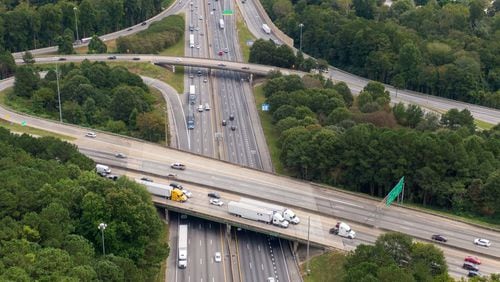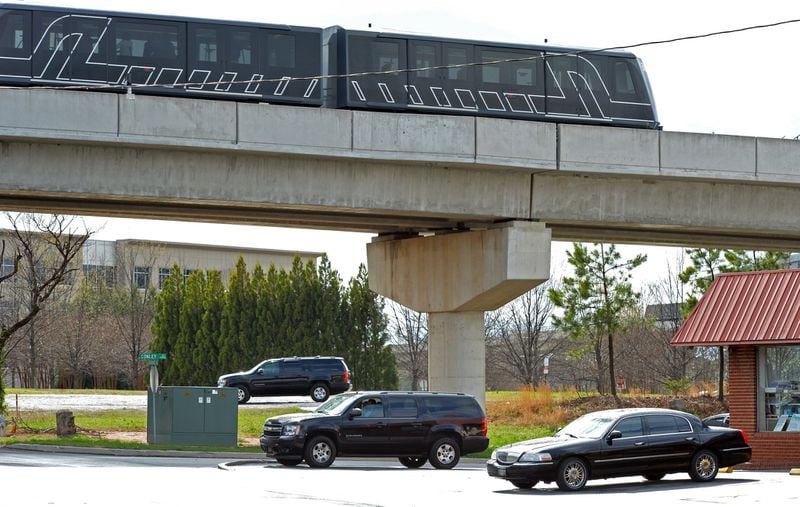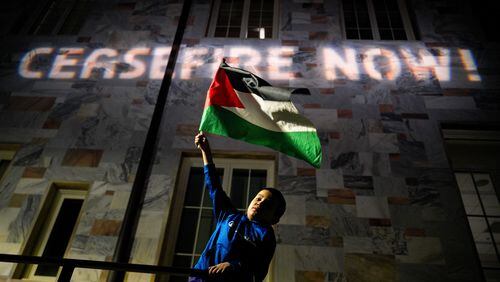A majority of Fulton County mayors said last week they want to keep using a sales tax to fund transportation infrastructure as they have been since 2017.
The 14 mayors — not including Atlanta, which has its own transportation tax — have been discussing a new Transportation Special Purpose Local Option Sales Tax for months. The proposed tax is expected to bring in roughly $500 million.
The mayors decided Friday to have voters consider a continued tax of three-quarters of a penny for five years to improve roads, sidewalks and other transportation infrastructure.
Now that the mayors have agreed on the size of the tax proposal, city leaders will spend the next few months deciding which projects they want to fund with the revenue. Voters will then get a chance to review the project list before voting on the tax in November.
What the mayors wouldn’t commit to on Friday is adding an additional fifth of a penny to the levy proposal, and dedicating that revenue to help fund two bus rapid transit projects.
One project would put BRT stations along Ga. 400 in north Fulton and the other effort would put BRT stations in southern Fulton, possibly along Roosevelt Highway.
The mayors reluctance to ask voters for a larger T-SPLOST comes at a crucial moment, with state and regional transportation leaders saying the projects are unlikely to happen without local contributions.
Russell McMurry, head of the Georgia Department of Transportation, tried to appeal to the mayors during a Friday meeting.
“The rocket is on the launchpad, the countdown has been initiated and we’re very close to blasting off with selecting a developer by the third quarter of this calendar year,” McMurry said, referring to the two BRT projects.
Chris Tomlinson, head of the Atlanta-Region Transit Link Authority, or the ATL, said his agency along with GDOT and MARTA have been planning on local support for years. “Changing and evolving plans year to year doesn’t help you drive forward,” he said.
But the mayors — many of whom are up for re-election this year — have voiced concerns of their own: How will voters react to being asked about a tax while their household budgets have been ravaged by the coronavirus pandemic? Will people even prioritize traffic as a problem when some haven’t commuted in a year? Will mayoral/council races turn into fights only about transit?
Credit: Hyosub Shin
Credit: Hyosub Shin
Many city leaders aren’t comfortable asking the public for additional tax revenue to fund projects, when they feel transportation officials didn’t ask for their input on the plan.
Chattahoochee Hills Mayor Tom Reed, who as head of South Fulton Municipal Association represented Southside mayors during T-SPLOST negotiations, said many area leaders feel there has been historic inequity — with more investment in the north part of the county compared to the south.
One of them is Union City Mayor Vince Williams, whose city council joined South Fulton’s council in being the only two in favor of the added transit tax.
“We can not make the mistake of not fighting for transit opportunities as it relates to economic development,” Williams said.
Some of the mayors are also concerned that adding a transit component could lead to voters rejecting the entire T-SPLOST.
“Maintaining roads and improving roads are some of the most expensive things you do as a city,” Johns Creek Mayor Bodker said after the meeting.
Bodker, whose city council hasn’t supported any of the proposed T-SPLOST plans, said he thinks the BRT projects won’t happen without a local sales tax.
Tomlinson presented a slide saying there was “a new reality” at the federal level. He said President Joe Biden wants to prioritize sustainable transportation; both of Georgia’s new Senators, Jon Ossoff and Raphael Warnock, are on a Senate committee for urban affairs; and Georgia has three Representatives on a House subcommittee for highways and transit.
Bodker said it is possible that cities would use some of their T-SPLOST funds on the BRT projects if the federal government also pitched in.
Fulton Commissioner Liz Hausmann, who also chairs a transportation subcommittee for the National Association of Counties, said local dollars are a big factor when the federal government is considering whether or not to help fund projects.
“We are in kind of a wait-and-see mode,” she said. “But we have to be prepared with some kind of local match or else we won’t be in the running.”
Credit: WSBTV Videos
About the Author








